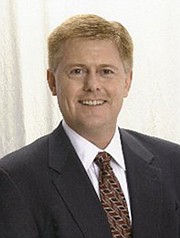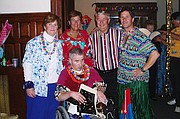The Northern Virginia Training Center spreads over 80 acres along Braddock Road, including facilities for administration, food service, programs, residences, a warehouse, transportation and therapy. Image courtesy of the Virginia Department of Behavioral Health and Developmental Services
According to the Virginia Department of Behavioral Health and Developmental Services, 63 residents still live and receive treatment at the Northern Virginia Training Center, located in Fairfax alongside Braddock Road.
The property, opened in 1973 and owned by the state of Virginia, is one of five regional facilities statewide for people with a variety of intellectual and physical disabilities.
In 2012, the training center had 152 residents and began a discharge process. The U.S. Department of Justice had called out the Commonwealth for isolating individuals with disabilities from their communities and and in its opinion discriminating against them.
The centers were also becoming less and less cost-effective to operate. Virginia and the Justice Department Settled in January 2012, with Virginia making a plan to close four of the five training centers and help residents transition to comparable housing options that are more integrated in communities.
MONEY FROM ANY SALE of land from the training centers, under Virginia Code, is designated for a Behavioral Health and Developmental Services Trust Fund.
“These funds are intended to improve services for individuals with behavioral health and developmental disorders, and to facilitate the transition of individuals from state training centers to community-based services,” Meghan McGuire, a spokesperson for the Department of Behavioral Health and Developmental Services, said in an email.
The Northern Virginia Training Center was initially scheduled to close in March 2015, but last summer, the Behavioral Health and Developmental Services commissioner Dr Debra Ferguson announced a one-year extension. At the same time, she declared the nearly 80 acres of property as “surplus,” meaning that with approval from the Virginia Secretary of Natural Resources and Governor, Virginia could sell the land.
On Friday May 22, the property came on the market, according to Dena Potter with the Department of General Services.
General Services “acts as the real estate agent” once a property becomes surplus, Potter said. The agency has contracted broker Divaris Real Estate, Inc., which put it on the public market. There’s no stated asking price, though the state is required to receive at least fair market value in any offers it considers, Potter explained.
The public sale came as somewhat of a surprise to Fairfax County supervisor John Cook (R-Braddock). The Northern Virginia Training Center is located in his district. Cook said County staff had been communicating with Virginia agency staff for the better part of a year about an interest in the property.
Fairfax County would look to partner with a private sector company for a public-private project that could both offer educational and training services for people with disabilities, and generate revenue to support those services.
“The county sees the land as an opportunity to do some really necessary and visionary things for public purposes,” said Cook. “By partnering with the private sector, it would reduce the cost.”
Cook said the vision could possibly include mixed use development, retail or office space, as well as career and technical education for public schools.
With the land for sale, Cook said the topic of action will likely come up at the Board’s next meeting on June 2. “Certainly I’m going to advocate,” he said. “I’d like to see the County look at making a proposal.”
Whether the County is able to purchase the land with a partner, or another buyer comes away with it, Cook is adamant no changes will come quickly. The land is zoned R1 for light residential and designated in the County’s comprehensive plan as a government facility.
“It’s not the case anybody can just walk in, buy the property and do something on it.” Rezoning and changing the comprehensive plan require approval by the Board of Supervisors and extensive public planning.
“No matter what is done, the community will have a very big say in how the land will be used,” Cook said.
Del. Eileen Filler-Corn (D), who represents the 41st District in the Virginia General Assembly, said in an email, “While the majority of the residents have moved out or are in the process of finding alternative permanent housing, the closing of the Center has highlighted the need for improved community-based services for those needing the most care. That is why I am pleased that the revenue generated from the sale will be deposited into the Behavioral Health and Development Services Trust Fund and be used to continue to enhance services for individuals in our system.”
Centreville resident Donna McHugh’s brother Joseph has lived at the Northern Virginia Training Center for over 30 years with cerebral palsy and spasticity issues. His condition and required treatment regimen have made him very difficult to place in a local option for comparable care and housing.
“All I know is there is no place for Joey in Northern Virginia,” McHugh said. “I’m worried about everybody else, also. I’m worried about a parent who has a child who hasn’t been born yet, who has serious complications.”
THE CLOSEST potential option the McHugh’s have visited is a four-bedroom house in Prince William County. It doesn’t have the same proximity to McHugh in Centreville or their sister Kim in Arlington. And it would be a step down in quality of life, according to McHugh, who said her brother currently has access to a summer camp, work environment, a pool and staff members who know him very well.
“I thought the goal was choice, placement and sustainability,” said Chris McHugh, Joseph’s brother and guardian together with Donna. “We have yet to have three comparable choices. For my brother’s needs, they haven’t met them yet.”
McHugh is critical of what he said still feels like a “railroad job” getting residents out of the facility before enough appropriate options are available.
Maria Reppas, another spokesperson for Behavioral Health and Developmental Services, said the remaining Northern Virginia Training Center residents have “between two and three options to choose from,” and that “one individual will be transitioning to another training center in the Commonwealth.”
The McHughs say they have yet to see a truly viable option, though a vendor fair is scheduled for the families of training center residents in early June.
“I’d move Joey tomorrow if I had the appropriate placement,” Donna said. “The reality is I want Joey close to Arlington. He has to have some consistency.”



